I am aware that the title of this blog is incorrect. What I had intended was "In Medias Res", the latin expression for into (or in) the middle of things. Sadly, I was a Latin student, and it didn't even jump out at me until recently.
Seeing as how:
A) Someone else already has "In Medias Res", and
B) I'm too lazy to think up another pseudo-intellectual title,
It will stand.
I guess I could play it off as if it was purposeful...a play on a phrase to make some shockingly witty comment about either the "media" or about typos on the internet, etc. But again, I'll refer you to point B, re: lazy.
In pigritia, veritas?
Monday, July 28, 2008
Monday, July 21, 2008
New (old) Music
In every group of friends there is that one person who seems to always know the next biggest thing in music before it hits...They were downloading mp3's when the rest of us still bought music on cassette...listening to the Shins long before Garden State...etc etc etc.
I'm not talking about the kind of music geek who can only feel good about themseleves if they're listening to the most obscure thing possible, so they can look down at anyone else with some sort of assumed indie cred..("You liked Cash's cover of Hurt? Yeah, I like the Oedipus and the Mamma's Boys version better..the one from the Icelandic import in '87, they only made 4 of them, on vinyl. You've probably never heard of them")
No, what I'm referring to is the audio shaman. The guy who always has the coolest new stuff and shares his bounty with you. You never know how he knows...he (or she) just does.
I am not that guy.
I am the guy who gets all my music suggestions FROM that guy, like unto a planet orbiting a sun, soaking up its musical radiance. I guess I'm ok with being the orbiting guy as compared to the guy who grew up in the 90's and hasn't listened to anything new since unless it was blaring over top 40 (even though we all know music achieved perfection in the mid-late 90's).
That's a long and overly elobarate way of saying here are some music suggestions that are going to be old news to the magical music folk among you, but somewhat new to me and hopefully very enjoyable to people like me who do not dwell on the cutting edge of the new:
1) The Decemberists - The Crane Wife
 - It's been out for some time now, but it still amazes me that more people haven't heard of/been turned on to the Decemberists. Take equal parts Neutral Milk Hotel and the Shins, add a dash of the History channel, and voila. Fun, well composed songs about...well...a lot of things. There are very few period dramas of any genre for which there is no corresponding Decemberists song. With vocals that are at first odd, but rapidly become oddly endearing, and a catalog that ranges from sea shanties of revenge (The mariner's revenge) to sparse and disarming love songs (Here I dreamt I was an architect) to poetic looks at the effect of war (16 Military wives). Some dismiss them as being a gimmicky version of NMH and other similar bands. The Crane Wife should lay some of those criticisms to bed. This, their latest effort, gels more as an album than any yet, and even in the ubiquitous "period pieces" (O Valencia) there is a subtle humor and word play that is evidence the band has furthered refined their captivating writing style. Who else could write a touchingly sorrowful ballad based on a japanese folk tale in such a way as to lend itself to form, with its separate chapters, the backbone of an album that is already strong with out? Definitely worth a listen.
- It's been out for some time now, but it still amazes me that more people haven't heard of/been turned on to the Decemberists. Take equal parts Neutral Milk Hotel and the Shins, add a dash of the History channel, and voila. Fun, well composed songs about...well...a lot of things. There are very few period dramas of any genre for which there is no corresponding Decemberists song. With vocals that are at first odd, but rapidly become oddly endearing, and a catalog that ranges from sea shanties of revenge (The mariner's revenge) to sparse and disarming love songs (Here I dreamt I was an architect) to poetic looks at the effect of war (16 Military wives). Some dismiss them as being a gimmicky version of NMH and other similar bands. The Crane Wife should lay some of those criticisms to bed. This, their latest effort, gels more as an album than any yet, and even in the ubiquitous "period pieces" (O Valencia) there is a subtle humor and word play that is evidence the band has furthered refined their captivating writing style. Who else could write a touchingly sorrowful ballad based on a japanese folk tale in such a way as to lend itself to form, with its separate chapters, the backbone of an album that is already strong with out? Definitely worth a listen.
2) Band of Horses - Cease to Begin (2007)/Everything All the Time (2006)
 Having released "cease to begin" in late 2007, I'm still counting it as new to me. Band of Horses combines elements of sparse and atmospheric guitars similar to Minus the Bear and others, with tight, layered and evolving sounds and wonderful overlapping harmonies. The range of material they cover on these two albums is pretty fantastic...everything from the spartan but rich harmonies of St Agustine to the more straight ahead rock of "Great Salt Lake" and indie quirkiness of "is there a Ghost". In a sea of music that is starting to wind down in uniqueness from the middle of the decade, band of Horses stands out with not only a unique sound, but a careful and well executed application of that sound to a set of well written songs.
Having released "cease to begin" in late 2007, I'm still counting it as new to me. Band of Horses combines elements of sparse and atmospheric guitars similar to Minus the Bear and others, with tight, layered and evolving sounds and wonderful overlapping harmonies. The range of material they cover on these two albums is pretty fantastic...everything from the spartan but rich harmonies of St Agustine to the more straight ahead rock of "Great Salt Lake" and indie quirkiness of "is there a Ghost". In a sea of music that is starting to wind down in uniqueness from the middle of the decade, band of Horses stands out with not only a unique sound, but a careful and well executed application of that sound to a set of well written songs.
3) The National- Boxer (2008)
 I'm still making my way through this pretty dense recording. Nothing soul-inspiring to say about it, just some great straight ahead "indie" rock tunes. It reminds me a lot of the lyrical content of REM mixed with some of the down and out blue collar sound of Springsteen. The album features folks like Sufjan Stevens, so you know already there's going to be a pretty interesting mix of sounds. very layered and satisfying album so far. If you're not a fan of the media fanfare for this latest album, their last album was also pretty stellar.
I'm still making my way through this pretty dense recording. Nothing soul-inspiring to say about it, just some great straight ahead "indie" rock tunes. It reminds me a lot of the lyrical content of REM mixed with some of the down and out blue collar sound of Springsteen. The album features folks like Sufjan Stevens, so you know already there's going to be a pretty interesting mix of sounds. very layered and satisfying album so far. If you're not a fan of the media fanfare for this latest album, their last album was also pretty stellar.
4) Dar Williams - My Better Self (2005)
 Having grown up in the northeast, it wasn't hard to get an appreciation for Dar Williams. Even if you weren't into folksy singer songwriter stuff, her songs overflowed with raw emotion in a way that was still compelling, playfull, and sometimes in a manner that cut to the bone before you realized you were bleeding. I still find it, embarasingly enough, almost painful to listen to the bittersweet "Southern California wants to be Western New York" because it captures a sense of the place I'm from in a way that is inherently real. I really got into Dar during the late 90's, listening to tracks like Mortal City, As Cool as I Am, and Iowa on the albums from that period. i was already impressed with the sheer density of material on her albums. A mix of irreverence (Christians and the Pagans) and reverence (Are you out there) that really strikes a chord, in a very self-aware way. Her "latest", which I have just gotten through, is the same warm, mix of the playful (teen for God) and more serious (Empire), though neither side lacking in depth and quality of composition. For newcomers, start with Mortal City, but when you've gotten hooked, pick this album up too.
Having grown up in the northeast, it wasn't hard to get an appreciation for Dar Williams. Even if you weren't into folksy singer songwriter stuff, her songs overflowed with raw emotion in a way that was still compelling, playfull, and sometimes in a manner that cut to the bone before you realized you were bleeding. I still find it, embarasingly enough, almost painful to listen to the bittersweet "Southern California wants to be Western New York" because it captures a sense of the place I'm from in a way that is inherently real. I really got into Dar during the late 90's, listening to tracks like Mortal City, As Cool as I Am, and Iowa on the albums from that period. i was already impressed with the sheer density of material on her albums. A mix of irreverence (Christians and the Pagans) and reverence (Are you out there) that really strikes a chord, in a very self-aware way. Her "latest", which I have just gotten through, is the same warm, mix of the playful (teen for God) and more serious (Empire), though neither side lacking in depth and quality of composition. For newcomers, start with Mortal City, but when you've gotten hooked, pick this album up too.
5) Slaid Cleaves- Unsung (2006)
 This recommendation is probably a little more obscure than the others, but well worth a chance. When we came down to Houston, some friends introduced us to the music of Mr. Slaid Cleaves. Our first reaction was, "his name is...what?". Our second reaction was, "damn, this is pretty good. " Slaid Cleaves is the archtype of the Austin music scene folk/alt-country sort of singer. not country in the manner of yeehaa good old boy mainstream country, and not folk in the manner of "I gave my love cherry" type of folk, but about the best combination, with a touch of springsteen esque ballads mixed in. A New England native, Slaid lacks the Texas twang, but his voice cuts through the tracks regardless...it ranges from an urgent whisper to a road-dust saturated woot, to even the occasional, oddly fantastic, yodel. His previous albums are winding roads of hard-luck stories, ranging from singular personal tales of loss (Lydia) to epic storytelling type songs(Below). I think storyteller is perhaps the best description for Slaid. He specializes in stories that don't necessarily have happy endings, but it tends to make them all the more compelling in their bittersweet subtlty and honesty. I find it hard to think of anyone to compare him to, outside of the greats (Cash, W. Nelson) who don't really fit him anyway. I have comapred him to Kathleen Edwards, but it's more honest to say "kathleen Edwards sounds a bit like Slaid Cleaves" than vice versa.
This recommendation is probably a little more obscure than the others, but well worth a chance. When we came down to Houston, some friends introduced us to the music of Mr. Slaid Cleaves. Our first reaction was, "his name is...what?". Our second reaction was, "damn, this is pretty good. " Slaid Cleaves is the archtype of the Austin music scene folk/alt-country sort of singer. not country in the manner of yeehaa good old boy mainstream country, and not folk in the manner of "I gave my love cherry" type of folk, but about the best combination, with a touch of springsteen esque ballads mixed in. A New England native, Slaid lacks the Texas twang, but his voice cuts through the tracks regardless...it ranges from an urgent whisper to a road-dust saturated woot, to even the occasional, oddly fantastic, yodel. His previous albums are winding roads of hard-luck stories, ranging from singular personal tales of loss (Lydia) to epic storytelling type songs(Below). I think storyteller is perhaps the best description for Slaid. He specializes in stories that don't necessarily have happy endings, but it tends to make them all the more compelling in their bittersweet subtlty and honesty. I find it hard to think of anyone to compare him to, outside of the greats (Cash, W. Nelson) who don't really fit him anyway. I have comapred him to Kathleen Edwards, but it's more honest to say "kathleen Edwards sounds a bit like Slaid Cleaves" than vice versa.
Unsung is a reflection of the vibrant Austin music scene, where collaboration among emerging artists is just part of the tapestry of the lifestyle. It's a collection of "covers" of friends' songs, although one could easily argue that among the artists that occupy Slaid's musical corner of the world, he played as much a part in their creation as they did the tracks of his previous album. I especially recommend "Flowered Dresses", "Call it Sleep" and "Another Kind of Blue". Simple, poignant pieces stripped down to their essentials. They pretty much define his style, and why we keep going back to see him every time he's in town, usually playing small crowded pubs like McGonnigals' "Mucky Duck" even after the success of several albums in a row. Slaid is still the half-road-weary and unassuming poet, and is all the more appealing for it.
Bonus: My somewhat abstract (long exposure for light trails) shot of Slaid in concert.
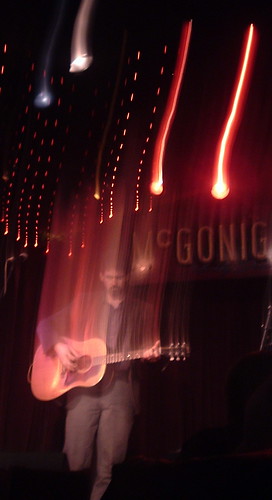
I'm not talking about the kind of music geek who can only feel good about themseleves if they're listening to the most obscure thing possible, so they can look down at anyone else with some sort of assumed indie cred..("You liked Cash's cover of Hurt? Yeah, I like the Oedipus and the Mamma's Boys version better..the one from the Icelandic import in '87, they only made 4 of them, on vinyl. You've probably never heard of them")
No, what I'm referring to is the audio shaman. The guy who always has the coolest new stuff and shares his bounty with you. You never know how he knows...he (or she) just does.
I am not that guy.
I am the guy who gets all my music suggestions FROM that guy, like unto a planet orbiting a sun, soaking up its musical radiance. I guess I'm ok with being the orbiting guy as compared to the guy who grew up in the 90's and hasn't listened to anything new since unless it was blaring over top 40 (even though we all know music achieved perfection in the mid-late 90's).
That's a long and overly elobarate way of saying here are some music suggestions that are going to be old news to the magical music folk among you, but somewhat new to me and hopefully very enjoyable to people like me who do not dwell on the cutting edge of the new:
1) The Decemberists - The Crane Wife
 - It's been out for some time now, but it still amazes me that more people haven't heard of/been turned on to the Decemberists. Take equal parts Neutral Milk Hotel and the Shins, add a dash of the History channel, and voila. Fun, well composed songs about...well...a lot of things. There are very few period dramas of any genre for which there is no corresponding Decemberists song. With vocals that are at first odd, but rapidly become oddly endearing, and a catalog that ranges from sea shanties of revenge (The mariner's revenge) to sparse and disarming love songs (Here I dreamt I was an architect) to poetic looks at the effect of war (16 Military wives). Some dismiss them as being a gimmicky version of NMH and other similar bands. The Crane Wife should lay some of those criticisms to bed. This, their latest effort, gels more as an album than any yet, and even in the ubiquitous "period pieces" (O Valencia) there is a subtle humor and word play that is evidence the band has furthered refined their captivating writing style. Who else could write a touchingly sorrowful ballad based on a japanese folk tale in such a way as to lend itself to form, with its separate chapters, the backbone of an album that is already strong with out? Definitely worth a listen.
- It's been out for some time now, but it still amazes me that more people haven't heard of/been turned on to the Decemberists. Take equal parts Neutral Milk Hotel and the Shins, add a dash of the History channel, and voila. Fun, well composed songs about...well...a lot of things. There are very few period dramas of any genre for which there is no corresponding Decemberists song. With vocals that are at first odd, but rapidly become oddly endearing, and a catalog that ranges from sea shanties of revenge (The mariner's revenge) to sparse and disarming love songs (Here I dreamt I was an architect) to poetic looks at the effect of war (16 Military wives). Some dismiss them as being a gimmicky version of NMH and other similar bands. The Crane Wife should lay some of those criticisms to bed. This, their latest effort, gels more as an album than any yet, and even in the ubiquitous "period pieces" (O Valencia) there is a subtle humor and word play that is evidence the band has furthered refined their captivating writing style. Who else could write a touchingly sorrowful ballad based on a japanese folk tale in such a way as to lend itself to form, with its separate chapters, the backbone of an album that is already strong with out? Definitely worth a listen.2) Band of Horses - Cease to Begin (2007)/Everything All the Time (2006)
 Having released "cease to begin" in late 2007, I'm still counting it as new to me. Band of Horses combines elements of sparse and atmospheric guitars similar to Minus the Bear and others, with tight, layered and evolving sounds and wonderful overlapping harmonies. The range of material they cover on these two albums is pretty fantastic...everything from the spartan but rich harmonies of St Agustine to the more straight ahead rock of "Great Salt Lake" and indie quirkiness of "is there a Ghost". In a sea of music that is starting to wind down in uniqueness from the middle of the decade, band of Horses stands out with not only a unique sound, but a careful and well executed application of that sound to a set of well written songs.
Having released "cease to begin" in late 2007, I'm still counting it as new to me. Band of Horses combines elements of sparse and atmospheric guitars similar to Minus the Bear and others, with tight, layered and evolving sounds and wonderful overlapping harmonies. The range of material they cover on these two albums is pretty fantastic...everything from the spartan but rich harmonies of St Agustine to the more straight ahead rock of "Great Salt Lake" and indie quirkiness of "is there a Ghost". In a sea of music that is starting to wind down in uniqueness from the middle of the decade, band of Horses stands out with not only a unique sound, but a careful and well executed application of that sound to a set of well written songs.3) The National- Boxer (2008)
 I'm still making my way through this pretty dense recording. Nothing soul-inspiring to say about it, just some great straight ahead "indie" rock tunes. It reminds me a lot of the lyrical content of REM mixed with some of the down and out blue collar sound of Springsteen. The album features folks like Sufjan Stevens, so you know already there's going to be a pretty interesting mix of sounds. very layered and satisfying album so far. If you're not a fan of the media fanfare for this latest album, their last album was also pretty stellar.
I'm still making my way through this pretty dense recording. Nothing soul-inspiring to say about it, just some great straight ahead "indie" rock tunes. It reminds me a lot of the lyrical content of REM mixed with some of the down and out blue collar sound of Springsteen. The album features folks like Sufjan Stevens, so you know already there's going to be a pretty interesting mix of sounds. very layered and satisfying album so far. If you're not a fan of the media fanfare for this latest album, their last album was also pretty stellar.4) Dar Williams - My Better Self (2005)
 Having grown up in the northeast, it wasn't hard to get an appreciation for Dar Williams. Even if you weren't into folksy singer songwriter stuff, her songs overflowed with raw emotion in a way that was still compelling, playfull, and sometimes in a manner that cut to the bone before you realized you were bleeding. I still find it, embarasingly enough, almost painful to listen to the bittersweet "Southern California wants to be Western New York" because it captures a sense of the place I'm from in a way that is inherently real. I really got into Dar during the late 90's, listening to tracks like Mortal City, As Cool as I Am, and Iowa on the albums from that period. i was already impressed with the sheer density of material on her albums. A mix of irreverence (Christians and the Pagans) and reverence (Are you out there) that really strikes a chord, in a very self-aware way. Her "latest", which I have just gotten through, is the same warm, mix of the playful (teen for God) and more serious (Empire), though neither side lacking in depth and quality of composition. For newcomers, start with Mortal City, but when you've gotten hooked, pick this album up too.
Having grown up in the northeast, it wasn't hard to get an appreciation for Dar Williams. Even if you weren't into folksy singer songwriter stuff, her songs overflowed with raw emotion in a way that was still compelling, playfull, and sometimes in a manner that cut to the bone before you realized you were bleeding. I still find it, embarasingly enough, almost painful to listen to the bittersweet "Southern California wants to be Western New York" because it captures a sense of the place I'm from in a way that is inherently real. I really got into Dar during the late 90's, listening to tracks like Mortal City, As Cool as I Am, and Iowa on the albums from that period. i was already impressed with the sheer density of material on her albums. A mix of irreverence (Christians and the Pagans) and reverence (Are you out there) that really strikes a chord, in a very self-aware way. Her "latest", which I have just gotten through, is the same warm, mix of the playful (teen for God) and more serious (Empire), though neither side lacking in depth and quality of composition. For newcomers, start with Mortal City, but when you've gotten hooked, pick this album up too.5) Slaid Cleaves- Unsung (2006)
 This recommendation is probably a little more obscure than the others, but well worth a chance. When we came down to Houston, some friends introduced us to the music of Mr. Slaid Cleaves. Our first reaction was, "his name is...what?". Our second reaction was, "damn, this is pretty good. " Slaid Cleaves is the archtype of the Austin music scene folk/alt-country sort of singer. not country in the manner of yeehaa good old boy mainstream country, and not folk in the manner of "I gave my love cherry" type of folk, but about the best combination, with a touch of springsteen esque ballads mixed in. A New England native, Slaid lacks the Texas twang, but his voice cuts through the tracks regardless...it ranges from an urgent whisper to a road-dust saturated woot, to even the occasional, oddly fantastic, yodel. His previous albums are winding roads of hard-luck stories, ranging from singular personal tales of loss (Lydia) to epic storytelling type songs(Below). I think storyteller is perhaps the best description for Slaid. He specializes in stories that don't necessarily have happy endings, but it tends to make them all the more compelling in their bittersweet subtlty and honesty. I find it hard to think of anyone to compare him to, outside of the greats (Cash, W. Nelson) who don't really fit him anyway. I have comapred him to Kathleen Edwards, but it's more honest to say "kathleen Edwards sounds a bit like Slaid Cleaves" than vice versa.
This recommendation is probably a little more obscure than the others, but well worth a chance. When we came down to Houston, some friends introduced us to the music of Mr. Slaid Cleaves. Our first reaction was, "his name is...what?". Our second reaction was, "damn, this is pretty good. " Slaid Cleaves is the archtype of the Austin music scene folk/alt-country sort of singer. not country in the manner of yeehaa good old boy mainstream country, and not folk in the manner of "I gave my love cherry" type of folk, but about the best combination, with a touch of springsteen esque ballads mixed in. A New England native, Slaid lacks the Texas twang, but his voice cuts through the tracks regardless...it ranges from an urgent whisper to a road-dust saturated woot, to even the occasional, oddly fantastic, yodel. His previous albums are winding roads of hard-luck stories, ranging from singular personal tales of loss (Lydia) to epic storytelling type songs(Below). I think storyteller is perhaps the best description for Slaid. He specializes in stories that don't necessarily have happy endings, but it tends to make them all the more compelling in their bittersweet subtlty and honesty. I find it hard to think of anyone to compare him to, outside of the greats (Cash, W. Nelson) who don't really fit him anyway. I have comapred him to Kathleen Edwards, but it's more honest to say "kathleen Edwards sounds a bit like Slaid Cleaves" than vice versa.Unsung is a reflection of the vibrant Austin music scene, where collaboration among emerging artists is just part of the tapestry of the lifestyle. It's a collection of "covers" of friends' songs, although one could easily argue that among the artists that occupy Slaid's musical corner of the world, he played as much a part in their creation as they did the tracks of his previous album. I especially recommend "Flowered Dresses", "Call it Sleep" and "Another Kind of Blue". Simple, poignant pieces stripped down to their essentials. They pretty much define his style, and why we keep going back to see him every time he's in town, usually playing small crowded pubs like McGonnigals' "Mucky Duck" even after the success of several albums in a row. Slaid is still the half-road-weary and unassuming poet, and is all the more appealing for it.
Bonus: My somewhat abstract (long exposure for light trails) shot of Slaid in concert.

Sunday, July 20, 2008
What's that? I can't hear you over that couch...
....it's a little loud.
So with grad school and hand me down furniture on its last leg, we've been slowly replacing our furnishings with "real" furniture.
There are many shady industries in the world. Used cars. Amway. Drug trafficking.
But nothing short of, say, public relations for Karl Rove, is as much of a racket as furniture retailing.
Before I posted this I had actually written a fairly long diatribe about consumer excess, conspicuous consumption, and taste in general, but I've noticed my posts have been a bit long-winded as of late, as well as a bit too stream of conscious, so I'll simply say Houston furniture stores (outside of national chains) are a fairly bizarre mix of 1) newly rich folks with pretty poor taste, 2) a general willingness to pay sticker price without question, and 3) Texan fascination with all things oversized (especially if they are of and/or relating to cows). You end up with what is essentially sheer nouveau-riche madness upholstered in bi-cast leather:

"We can't fit any more stuffing in!" "DAMN IT, KEEP STUFFING". You know how they say dogs look like their owners? ....There's nothing more classy in a $2000 couch than plastic cupholders.

As much of an affront to all things holy as this chair is, what really made it funny was 1) it was in the "fancy room". Of the 20,000 foot warehouse. 2) that 20,000 foot warehouses have "fancy rooms", and 3) that this is the last one, meaning at least one other person paid $1500+ for this chair. Must have gotten carried away by the sheer fanciness.

It's the mullet of chairs...business up front, party in the back. Somewhere, a cow is haunting the living hell out of a furniture maker.

The couch/chair in this one are actually some of the nicer pieces we saw that day. Unfortunately, what doesn't show up as well is the large circular ottoman in front of them. It gave the general appearance that someone had taken an antelope and stretched its hide over a wagon wheel. A salesperson passing by heard us trying to figure out what animal it used to be and REASSURED us it was "faux hide". So someone, somewhere created a process to make fake cowhide-with-fur-still-attached in order to create this ottoman. I'm not sure that's reassuring.
I wish I could impress upon people that bargaining is not a social faux pas to be avoided at any cost. It's part of the industry. Furniture is like cars. If you pay sticker price, or a price greater than the rational value you perceive in that item, you're getting had. Bargain . (If for no other reason than to reduce the incentive for producers to do some of these outrageous things to cows posthumously:) )
So with grad school and hand me down furniture on its last leg, we've been slowly replacing our furnishings with "real" furniture.
There are many shady industries in the world. Used cars. Amway. Drug trafficking.
But nothing short of, say, public relations for Karl Rove, is as much of a racket as furniture retailing.
Before I posted this I had actually written a fairly long diatribe about consumer excess, conspicuous consumption, and taste in general, but I've noticed my posts have been a bit long-winded as of late, as well as a bit too stream of conscious, so I'll simply say Houston furniture stores (outside of national chains) are a fairly bizarre mix of 1) newly rich folks with pretty poor taste, 2) a general willingness to pay sticker price without question, and 3) Texan fascination with all things oversized (especially if they are of and/or relating to cows). You end up with what is essentially sheer nouveau-riche madness upholstered in bi-cast leather:

"We can't fit any more stuffing in!" "DAMN IT, KEEP STUFFING". You know how they say dogs look like their owners? ....There's nothing more classy in a $2000 couch than plastic cupholders.

As much of an affront to all things holy as this chair is, what really made it funny was 1) it was in the "fancy room". Of the 20,000 foot warehouse. 2) that 20,000 foot warehouses have "fancy rooms", and 3) that this is the last one, meaning at least one other person paid $1500+ for this chair. Must have gotten carried away by the sheer fanciness.

It's the mullet of chairs...business up front, party in the back. Somewhere, a cow is haunting the living hell out of a furniture maker.

The couch/chair in this one are actually some of the nicer pieces we saw that day. Unfortunately, what doesn't show up as well is the large circular ottoman in front of them. It gave the general appearance that someone had taken an antelope and stretched its hide over a wagon wheel. A salesperson passing by heard us trying to figure out what animal it used to be and REASSURED us it was "faux hide". So someone, somewhere created a process to make fake cowhide-with-fur-still-attached in order to create this ottoman. I'm not sure that's reassuring.
I wish I could impress upon people that bargaining is not a social faux pas to be avoided at any cost. It's part of the industry. Furniture is like cars. If you pay sticker price, or a price greater than the rational value you perceive in that item, you're getting had. Bargain . (If for no other reason than to reduce the incentive for producers to do some of these outrageous things to cows posthumously:) )
Saturday, July 19, 2008
An accounting of nature
In the federal system of protected places, lands, and monuments there are no fewer than 1300 places we have designated as having unique natural or historical value.
I have always been an unabashed supporter of our National Parks and places. Moving to Houston, a place where history and nature are a distant second thought, if that, only served to accent my love. To me, the conservation ethic embodied in this system is something that strikes at the heart of what this nation was and is. May it ever be so.
In a nation still rapidly converting its open space into cookie-cutter developments of pre-fabricated McMansions, it is comforting to know that, even with the less-than-wise development patterns we have come to embrace on the local level, there are still refuges, last stands of sanity.It would be nice if this ethic extended to the environment all around us rather than just officially designated parcels, as if nature was only something we "go to". Without coming off as too much the sort who revels in arboreal embraces, there is more tied up in these last pieces of wilderness than just a piece of land on a map. They are simultaneously a continuing national commitment, and a recognition that the greatness of our nation stems not just from its government and people, but in the relation of those people to the land, the one element that stands constant across the sweep of history.
At last count I have been to only 46 of those 1300+ places, including only 8 of the National Parks. (Current National Park count: Arches, Bryce, Haleakala, Zion, Capitol Reef, Shenandoah, Mammoth Cave, and the Grand Canyon.)
Time to stop typing, and get hiking.
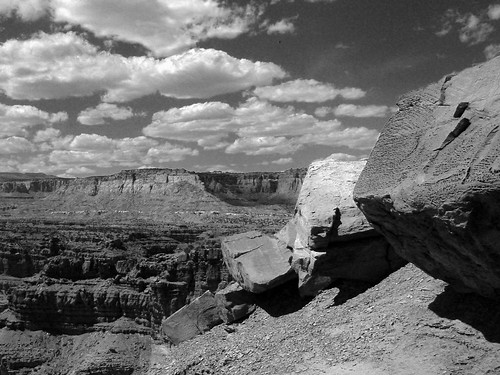
Capitol Reef National Park
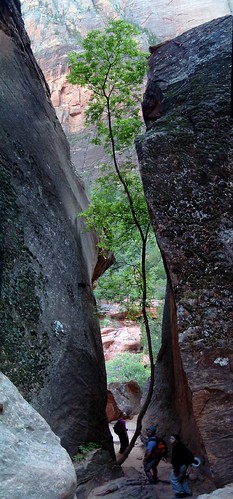
Zion NP
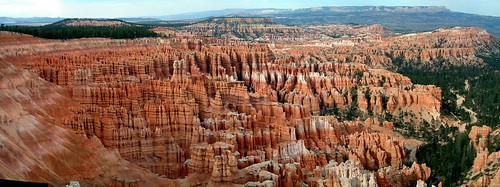
Bryce NP
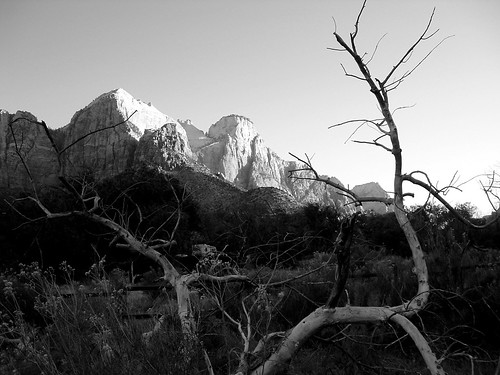
Zion NP
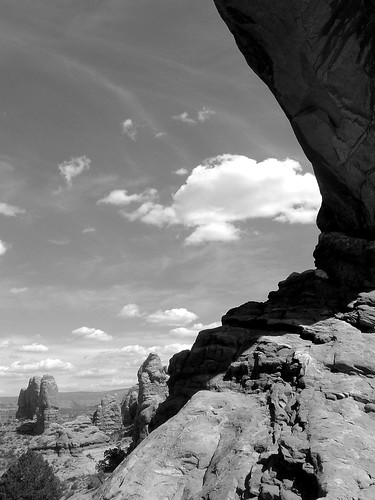
Arches, NP
I have always been an unabashed supporter of our National Parks and places. Moving to Houston, a place where history and nature are a distant second thought, if that, only served to accent my love. To me, the conservation ethic embodied in this system is something that strikes at the heart of what this nation was and is. May it ever be so.
In a nation still rapidly converting its open space into cookie-cutter developments of pre-fabricated McMansions, it is comforting to know that, even with the less-than-wise development patterns we have come to embrace on the local level, there are still refuges, last stands of sanity.It would be nice if this ethic extended to the environment all around us rather than just officially designated parcels, as if nature was only something we "go to". Without coming off as too much the sort who revels in arboreal embraces, there is more tied up in these last pieces of wilderness than just a piece of land on a map. They are simultaneously a continuing national commitment, and a recognition that the greatness of our nation stems not just from its government and people, but in the relation of those people to the land, the one element that stands constant across the sweep of history.
At last count I have been to only 46 of those 1300+ places, including only 8 of the National Parks. (Current National Park count: Arches, Bryce, Haleakala, Zion, Capitol Reef, Shenandoah, Mammoth Cave, and the Grand Canyon.)
Time to stop typing, and get hiking.

Capitol Reef National Park

Zion NP

Bryce NP

Zion NP

Arches, NP
Friday, July 18, 2008
No Miss Muffet, I.
So a little personal secret to share. I have, at times, been a raving arachnophobe.
Not only that, but a very selective raging arachnophobe. Tiny little house spiders didn't phase me...the type of miniscule little fellows who might skitter across the top of a table at what must be high velocity to one the size of a pen tip. The largest fellows didn't really affect me either...the huge hairy tarantulas and such. I have a healthy respect for them, but they didn't really inspire in me the GET'EMOFFMEGET'EMOFFME's like the middle sized ones. The long, spindly legged garden spider, the viscious-looking evil-bit-sized orb weavers and such.
I admit it isn't the rarest of phobias. I'm not in the same league with the fellow who's, say, deathly afraid of swiss cheese, or won't go outside, or is chilled to the marrow of his bones by Barry Manilow (then again, for the latter, who isn't, really..). But it is fairly specific in terms of arachnophobia to be scared of just one size of spider, I suppose.
I'm not a fearful person in general.
I like the dark.
I've jumped out of a perfectly good airplane.
I live in Texas.
However, there's just something about these type of spiders that really filled me with an irrational dread.
I'm not sure how or where the fear arose. I grew up in the country...I'm certainly no city-dweller sheltered and fearing of beasties from a forest primeval. And it would be easy to blame part of it on more rational causes. I read once that humans instinctively tend to react negatively to spiders, because of the patterns of their movements. That alien way of locomotion apparently triggers some menace in the pattern recognition elements of our brains. Those who are arachnophobes, the article mentioned, may possibly be (all other factors controlled for) more attuned to this pattern recognition warning. I would love to think of myself as having this sort of highly attuned spider sense (with all apologies to Peter Parker), but I don't think that's the case.
At one point I blamed it on that childhood in the country. We lived in a large old farmhouse..the type of place locals still refer to by the name of the original owner, or at least the owner three or four owners back, regardless of who inhabits it currently. To them, it was less a real dwelling with living owners, and more a mythical landmark from their childhood. The old "Douglas Mansion" sat on a small outcrop just above the floodplain of a small creek. It backed up to woods and wetlands that went on seemingly without end. In the dead of summer, when the black flies and mosquitos close to blotted out the sun, and the dragon and damselflies danced over the marsh, the night belonged to the spiders. I remember as a child, waking in the night, watching the shadows of small things dangling in the moonlight outside the window. If one turned on the lights , one would be greeted with the sight of a window literally dripping with large spiders of all varities...hairy fishing and nursery web spiders, garden spiders brightly striped in the black and yellow colors of warning signs, and all manner of long limbed unidentifiable arachnids fighting for space in the insect rich gathering grounds near the outside lights and windows. I remember going down to our kitchen one particularly hot evening (hot because, unlike the air conditioned surreality of the City, we lived in the heat of the season, with only a patched and chugging box fan in the window making its feeble drone against the sultry, stagnant air.) and turning on the lights. In the kitchen there was a large series of picture windows, covering the majority of one wall, looking out over fields and stands of birch, with the lines of old growth pines standing sentinel against the sky miles away. In the day, I could sit and stare out those windows all day, watching the hawks circle over the hay fields and the deer pass tenatively across the highway. But at night, they became something more sinister...if my bedroom window dripped with spiders, these windows pulsated with them. The lights brought the insects to the windows, and there were times at night, for the spiders and the webs, that you could barely see out of the large panes. There are few moments in my young life that were quite as horrifying as the first time I turned on the kitchen lights one hot summer night, only to see the windows squirm in response, a sudden motion of dark crawling things, as if the black of night had suddenly come alive, writhing against the window, coming to get me. All the nightmares and imaginings that lurked just beyond the edge of the nightlight in my young head were suddenly real and tangible.
While nights like that were acute in the horror they inspired, it was the basement that really formed my chronic dread. Our house was old, as I said, built by settlers who had hewn stone from the virgin earth, and dug deep, building foundations of solid rock beneath supporting beams of roughly hewn whole trees. Our cellar was not a basement of the finsihed, suburban variety. Until I was a bit older, I'm not sure I even knew such things existed. Our basement was the archetype for cellars. It was large, occupying a good portion of the space under an equally large old house. Its walls were built of the fieldstones and rock quarried locally, uneven and irregular. Its floor was cobbles loosley strewn over dirt which scarcely covered the bedrock below and was consistently damp. Its extent and recesses, barely lit by a single, dangling 60 watt bulb, held alcoves and side passages whose original purpose was lost to us, serving only now to heighten the forboding we felt at descending down the rickety staircase to its depths. And it was strewn with spiders. In every way it was far more akin to the average catacomb or dungeon than it was to a living space. It's as if, like the Tolkein's dwarves, the builders had dug TOO deeply and greedily and their carelessness had unleashed an ancient menace into the caverns below our home. I would have been just as happy to seal this place away and never venture there, except that the unfortunate placement of the washer and drier connections meant routine expeditions into the darkness. The sense of descending into a world you do not hold dominion over only served to heighten the fear of the arachnid denizens that dwelt, in mysteriously large numbers for the seeming lack of prey, therein. If I have any speed or skill at sprinting, I credit it largely to the land speed records set in the dashes in and out of that dark place.
I like to think my childhood is part of the reason that I'm skittish of these spiders in adulthood.
I remember, years later during grad school, visiting my wife, then girlfirend, at university in Madison, WI. It was in the fall, and some particular type of orb weaver, one of the vaguely uniform and ubiquitous grey and brown, long legged types, had infested fairly large amounts of the street we walked down. Every awning sheltered large webs, and spider dangled from invisible threads at face level. I spent the better part of what should have been a lovely fall walk dodging awnings, looking up with dread, and realizing as she calmly sauntered past them that I, the boy who extolled the virtues of nature and wore his childhood in the country as a badge of honor, was an arachnophobe.
At first it angered me. I was a naturalist at heart, a man of science, and not someone who considered himself prone to irrational fears. How could I be reduced to this skittish mare by something I clearly outranked on the evolutionary scale. (for those of the camp that all living things are equal, I make my judgement of placement in evolutionary hierarchy not in terms of inherent worth, but in more simplistic comparisons of who could squash whom.) It did not help that at that time, it had been a good year for the large black-and-yellow garden spiders (argiope aurentia, I believe, in this case) where I lived, and my existential struggle was played out against a backdrop of large decidely evil-looking spiders everywhere I went. It continued to bother me for several years. I think everyone, to some degree, feels uncomfortable in situations where they feel out of control, helpless. The specifics of my life, outside of spiders, only lend themselves to accenting that aversion to helplessness. So for me, not being able to conquer that fear became more than a minor annoyance, it became a real issue.
I'd like to say that I had a miraculous break through, that all my problems were solved by a clear and firm application of manly will. Unfortunately, I still get the willies to some extent. My antidote now is photography. When I moved down to Texas I encountered spiders as proportionately large as everything else in this bloated, overblown state. But in several forrays out into what passes for the natural world here, I began to notice that when there was a camera between me and spiders, even the huge and unquestionably menacing looking Golden Silk spiders (nephila clavipes, for the sciency folk among you), my fear dissapated. My curiosity overtook me, and the lens gave a sense of empowerment. It may seem juvenile, it may seem a crutch, but now I actively seek out spiders. I still get that tingle of dread, but the desire to record, to classify, to name the unknown pushes it aside. I'm still not to the point of some of the rangers I have befriended at Brazos Bend state park, an area literally awash in golden silk webs, who are quite content to handle and play with the fist sized spiders, but I am more calm now in their presence.
It makes me think, in a more general/abstract sense, how we face fear, how we handle that ongoing battle between our rational thoughts and irrational impulses...when a crutch changes from a tool to a hinderance. To take it to a more absurd level, it reminds me of the progress of mankind in general...the drive to take back the night of fear by pushing superstsition to the boundaries of the light, classifying, naming the nameless, and in doing so , taking away its power.
I look forward to the day when I may be able to deal with the spider as it is, without fear, and without the crutch of the camera and the label, as just another critter sharing space with this slightly larger critter. And to me, that hope echoes the one I have for our society in general, if I may risk pretense for a moment. We have pulled ourseleves out of the night of superstition and fear of the supernatural lingering at the edge of shadow, but we still seem to have an innate need to name, to classify, to draw a box around things. This endless drive to assert our dominance by burying things beneath enough words. Everytime there is a tragedy, a natural disaster, we soak ourseleves in the 24 hour news cycle, taking what solace we can by wrapping the sharp edges of our pain in blankets of words and expert opinions and classification. I'm certainly not suggesting that such things are detrimental. I'm just wondering where the balance between the survival instinct of fight or flight as directed through a ravenous desire to beat our fears down with knowledge, and the ability to accept our fears, our pain, as they are without action, and therefore release ourselves from their effect. I think Hubert was pretty spot on in his fremen littany against fear...fear is a mind-killer. And conquering fear is not as much a case of fighting against it, crawling on top of the mountain of words you bury it in (and yes, I realize the inherent irony there given this post length), but a matter of looking deep into the place where people fear to look, and coming to terms with it. As long as fear and pain keep you running in circles to "deal" with them, they still has power over it.
Well, another ramble ends in existential hoohah. As before, I hope the following examples of my growing ability to deal with my particular fear will serve as compensation for reading. (Apparently blogger crops these to some degree, so I apologize about how the come out. Click on them to see the originals)
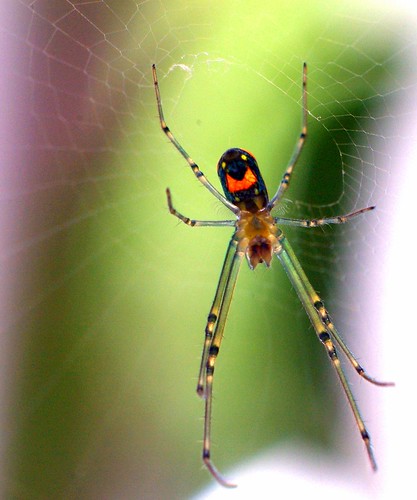
Orchard spider (underside)
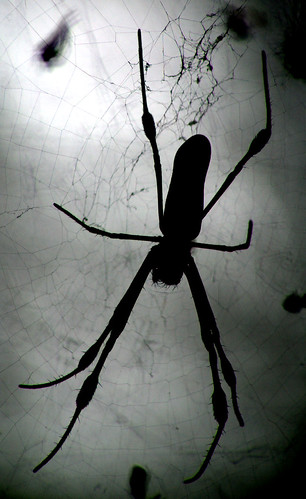
silhouette, golden-silk spider (nephila clavipes)
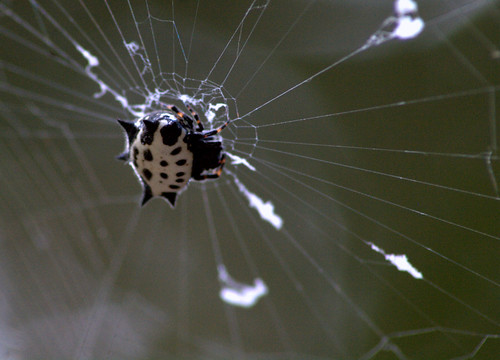
Spiny-backed Orb Weaver
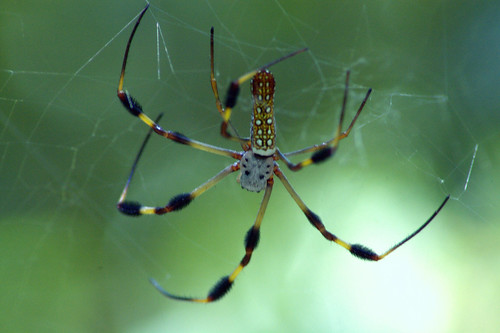
Female Golden Silk Orb Weaver (Nephila Clavipes)
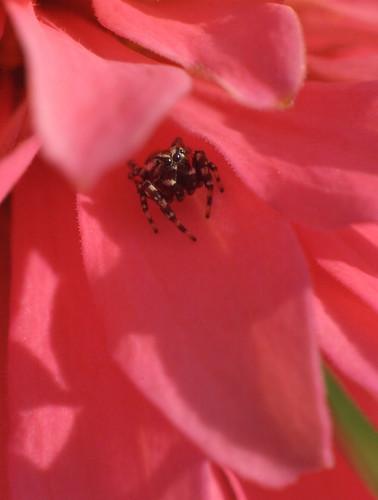
Unidentified Jumping Spider at 1:2 macro
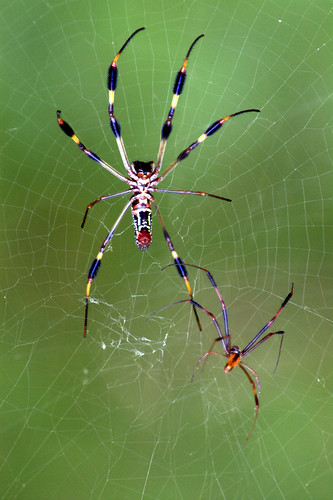
Female (large) and Male (small) Golden Silk Spider (nephila clavipes), the largest North American true spider (not counting mygalomorphs like tarantulas), non-macro
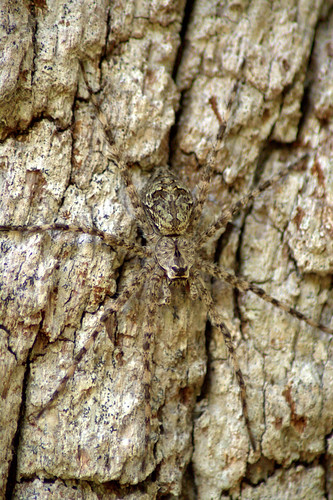
Dark Fishing Spider, non-macro

Wolf Spider with Egg Sac, ~1:2 macro

Long-jawed Orbweaver, 1:1 macro

Some variety of Wolf Spider, in shallow DoF, 1:1 macro
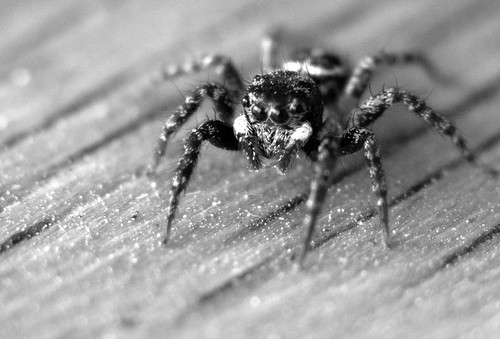
Jumping Spider, unclassified as of yet, 1:1 macro

Unknown tiny spider, at ~1.5:1 macro.

Hawaiian version of our common Garden Spider (Argiope Bruenichi?)
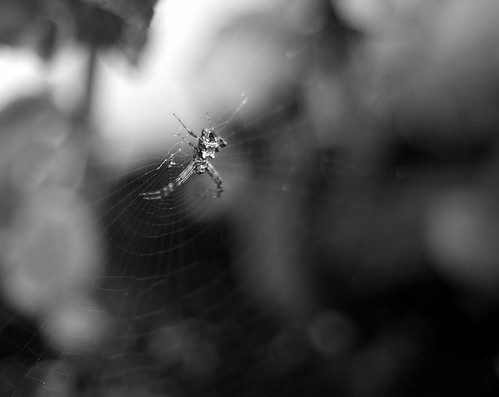
Not only that, but a very selective raging arachnophobe. Tiny little house spiders didn't phase me...the type of miniscule little fellows who might skitter across the top of a table at what must be high velocity to one the size of a pen tip. The largest fellows didn't really affect me either...the huge hairy tarantulas and such. I have a healthy respect for them, but they didn't really inspire in me the GET'EMOFFMEGET'EMOFFME's like the middle sized ones. The long, spindly legged garden spider, the viscious-looking evil-bit-sized orb weavers and such.
I admit it isn't the rarest of phobias. I'm not in the same league with the fellow who's, say, deathly afraid of swiss cheese, or won't go outside, or is chilled to the marrow of his bones by Barry Manilow (then again, for the latter, who isn't, really..). But it is fairly specific in terms of arachnophobia to be scared of just one size of spider, I suppose.
I'm not a fearful person in general.
I like the dark.
I've jumped out of a perfectly good airplane.
I live in Texas.
However, there's just something about these type of spiders that really filled me with an irrational dread.
I'm not sure how or where the fear arose. I grew up in the country...I'm certainly no city-dweller sheltered and fearing of beasties from a forest primeval. And it would be easy to blame part of it on more rational causes. I read once that humans instinctively tend to react negatively to spiders, because of the patterns of their movements. That alien way of locomotion apparently triggers some menace in the pattern recognition elements of our brains. Those who are arachnophobes, the article mentioned, may possibly be (all other factors controlled for) more attuned to this pattern recognition warning. I would love to think of myself as having this sort of highly attuned spider sense (with all apologies to Peter Parker), but I don't think that's the case.
At one point I blamed it on that childhood in the country. We lived in a large old farmhouse..the type of place locals still refer to by the name of the original owner, or at least the owner three or four owners back, regardless of who inhabits it currently. To them, it was less a real dwelling with living owners, and more a mythical landmark from their childhood. The old "Douglas Mansion" sat on a small outcrop just above the floodplain of a small creek. It backed up to woods and wetlands that went on seemingly without end. In the dead of summer, when the black flies and mosquitos close to blotted out the sun, and the dragon and damselflies danced over the marsh, the night belonged to the spiders. I remember as a child, waking in the night, watching the shadows of small things dangling in the moonlight outside the window. If one turned on the lights , one would be greeted with the sight of a window literally dripping with large spiders of all varities...hairy fishing and nursery web spiders, garden spiders brightly striped in the black and yellow colors of warning signs, and all manner of long limbed unidentifiable arachnids fighting for space in the insect rich gathering grounds near the outside lights and windows. I remember going down to our kitchen one particularly hot evening (hot because, unlike the air conditioned surreality of the City, we lived in the heat of the season, with only a patched and chugging box fan in the window making its feeble drone against the sultry, stagnant air.) and turning on the lights. In the kitchen there was a large series of picture windows, covering the majority of one wall, looking out over fields and stands of birch, with the lines of old growth pines standing sentinel against the sky miles away. In the day, I could sit and stare out those windows all day, watching the hawks circle over the hay fields and the deer pass tenatively across the highway. But at night, they became something more sinister...if my bedroom window dripped with spiders, these windows pulsated with them. The lights brought the insects to the windows, and there were times at night, for the spiders and the webs, that you could barely see out of the large panes. There are few moments in my young life that were quite as horrifying as the first time I turned on the kitchen lights one hot summer night, only to see the windows squirm in response, a sudden motion of dark crawling things, as if the black of night had suddenly come alive, writhing against the window, coming to get me. All the nightmares and imaginings that lurked just beyond the edge of the nightlight in my young head were suddenly real and tangible.
While nights like that were acute in the horror they inspired, it was the basement that really formed my chronic dread. Our house was old, as I said, built by settlers who had hewn stone from the virgin earth, and dug deep, building foundations of solid rock beneath supporting beams of roughly hewn whole trees. Our cellar was not a basement of the finsihed, suburban variety. Until I was a bit older, I'm not sure I even knew such things existed. Our basement was the archetype for cellars. It was large, occupying a good portion of the space under an equally large old house. Its walls were built of the fieldstones and rock quarried locally, uneven and irregular. Its floor was cobbles loosley strewn over dirt which scarcely covered the bedrock below and was consistently damp. Its extent and recesses, barely lit by a single, dangling 60 watt bulb, held alcoves and side passages whose original purpose was lost to us, serving only now to heighten the forboding we felt at descending down the rickety staircase to its depths. And it was strewn with spiders. In every way it was far more akin to the average catacomb or dungeon than it was to a living space. It's as if, like the Tolkein's dwarves, the builders had dug TOO deeply and greedily and their carelessness had unleashed an ancient menace into the caverns below our home. I would have been just as happy to seal this place away and never venture there, except that the unfortunate placement of the washer and drier connections meant routine expeditions into the darkness. The sense of descending into a world you do not hold dominion over only served to heighten the fear of the arachnid denizens that dwelt, in mysteriously large numbers for the seeming lack of prey, therein. If I have any speed or skill at sprinting, I credit it largely to the land speed records set in the dashes in and out of that dark place.
I like to think my childhood is part of the reason that I'm skittish of these spiders in adulthood.
I remember, years later during grad school, visiting my wife, then girlfirend, at university in Madison, WI. It was in the fall, and some particular type of orb weaver, one of the vaguely uniform and ubiquitous grey and brown, long legged types, had infested fairly large amounts of the street we walked down. Every awning sheltered large webs, and spider dangled from invisible threads at face level. I spent the better part of what should have been a lovely fall walk dodging awnings, looking up with dread, and realizing as she calmly sauntered past them that I, the boy who extolled the virtues of nature and wore his childhood in the country as a badge of honor, was an arachnophobe.
At first it angered me. I was a naturalist at heart, a man of science, and not someone who considered himself prone to irrational fears. How could I be reduced to this skittish mare by something I clearly outranked on the evolutionary scale. (for those of the camp that all living things are equal, I make my judgement of placement in evolutionary hierarchy not in terms of inherent worth, but in more simplistic comparisons of who could squash whom.) It did not help that at that time, it had been a good year for the large black-and-yellow garden spiders (argiope aurentia, I believe, in this case) where I lived, and my existential struggle was played out against a backdrop of large decidely evil-looking spiders everywhere I went. It continued to bother me for several years. I think everyone, to some degree, feels uncomfortable in situations where they feel out of control, helpless. The specifics of my life, outside of spiders, only lend themselves to accenting that aversion to helplessness. So for me, not being able to conquer that fear became more than a minor annoyance, it became a real issue.
I'd like to say that I had a miraculous break through, that all my problems were solved by a clear and firm application of manly will. Unfortunately, I still get the willies to some extent. My antidote now is photography. When I moved down to Texas I encountered spiders as proportionately large as everything else in this bloated, overblown state. But in several forrays out into what passes for the natural world here, I began to notice that when there was a camera between me and spiders, even the huge and unquestionably menacing looking Golden Silk spiders (nephila clavipes, for the sciency folk among you), my fear dissapated. My curiosity overtook me, and the lens gave a sense of empowerment. It may seem juvenile, it may seem a crutch, but now I actively seek out spiders. I still get that tingle of dread, but the desire to record, to classify, to name the unknown pushes it aside. I'm still not to the point of some of the rangers I have befriended at Brazos Bend state park, an area literally awash in golden silk webs, who are quite content to handle and play with the fist sized spiders, but I am more calm now in their presence.
It makes me think, in a more general/abstract sense, how we face fear, how we handle that ongoing battle between our rational thoughts and irrational impulses...when a crutch changes from a tool to a hinderance. To take it to a more absurd level, it reminds me of the progress of mankind in general...the drive to take back the night of fear by pushing superstsition to the boundaries of the light, classifying, naming the nameless, and in doing so , taking away its power.
I look forward to the day when I may be able to deal with the spider as it is, without fear, and without the crutch of the camera and the label, as just another critter sharing space with this slightly larger critter. And to me, that hope echoes the one I have for our society in general, if I may risk pretense for a moment. We have pulled ourseleves out of the night of superstition and fear of the supernatural lingering at the edge of shadow, but we still seem to have an innate need to name, to classify, to draw a box around things. This endless drive to assert our dominance by burying things beneath enough words. Everytime there is a tragedy, a natural disaster, we soak ourseleves in the 24 hour news cycle, taking what solace we can by wrapping the sharp edges of our pain in blankets of words and expert opinions and classification. I'm certainly not suggesting that such things are detrimental. I'm just wondering where the balance between the survival instinct of fight or flight as directed through a ravenous desire to beat our fears down with knowledge, and the ability to accept our fears, our pain, as they are without action, and therefore release ourselves from their effect. I think Hubert was pretty spot on in his fremen littany against fear...fear is a mind-killer. And conquering fear is not as much a case of fighting against it, crawling on top of the mountain of words you bury it in (and yes, I realize the inherent irony there given this post length), but a matter of looking deep into the place where people fear to look, and coming to terms with it. As long as fear and pain keep you running in circles to "deal" with them, they still has power over it.
Well, another ramble ends in existential hoohah. As before, I hope the following examples of my growing ability to deal with my particular fear will serve as compensation for reading. (Apparently blogger crops these to some degree, so I apologize about how the come out. Click on them to see the originals)

Orchard spider (underside)

silhouette, golden-silk spider (nephila clavipes)

Spiny-backed Orb Weaver

Female Golden Silk Orb Weaver (Nephila Clavipes)

Unidentified Jumping Spider at 1:2 macro

Female (large) and Male (small) Golden Silk Spider (nephila clavipes), the largest North American true spider (not counting mygalomorphs like tarantulas), non-macro

Dark Fishing Spider, non-macro

Wolf Spider with Egg Sac, ~1:2 macro

Long-jawed Orbweaver, 1:1 macro

Some variety of Wolf Spider, in shallow DoF, 1:1 macro

Jumping Spider, unclassified as of yet, 1:1 macro

Unknown tiny spider, at ~1.5:1 macro.

Hawaiian version of our common Garden Spider (Argiope Bruenichi?)

Thursday, July 10, 2008
On Knowing
Explosions, music, and an existential dilemma. (warning, this post will likely be somewhat long winded and dry. The one directly below it is shorter and, arguably, wittier. feel free to skip)
So there I sat, on the lawn of the Hermann Park amphitheater, listening to the first lovely strains of Tchaikovsky's 1812 Overture (and the less lovely strains of "Whut tha hell, I thought this wuz tha one with tha cannons 'n s%^$." from neighboring blankets) on a balmy July 4th evening. It was a lovely rendition...Houston is renowned for its symphony, opera, etc...the very best that money can buy, which is, of course, the local equivalent for quality and culture, but still does manage to produce some enjoyable opportunities if one happens to be able to afford it, or is willing to sit on the lawn on July 4th, drinking in the spilled-over largess of an economy flush with oil cash.
But back to the 1812. I had one of those..."hey, wait a moment" moments, as the piece continued, and strains of the French national anthem were put in counterpoint to the main theme. I'm certainly not new to the piece. Even those who have had little exposure to classical music have at least heard the final theme from the piece, as it is carted out every 4th alongside our other national songs. I guess I had never thought much of it until the French angle started to make me wonder.
Why was the french national anthem a counterpoint in a song of the War of 1812?
Yes, yes history majors, I see you with your hands up, straining to be called on. As you would no doubt point out with all due smugness, the war of 1812 overture is not about the American War of 1812. It's an anthem memorializing the Russian defeat of the French under Napoleon at such and such a battle that just happened to be in 1812, which, since it has nothing to do with Nascar, American Idol, or celebrity scandals, is probably lost on the collective knowledge of the vast majority of us. The main point being it has nothing to so with the U.S. history, and thus the French theme is very fitting for the piece.
So that, of course, begs the question, "why do we play it on our 4th of July celebration?"
A more cynical man than I would argue that it has something to do with "OMG DOOD, TEH CANNONZ!!! BLOWIN UP S%&^ IS AWESUM!!!".
And here is where this long winded posts take the turn from the random example to the more general concept it brought to light for me...
To find out this answer, I did what every curious person who has not been living under a rock in a cave in a remote region of Kazakhstan does.....I wiki'd it.
And of course, there were very logical historical and cultural explanations of the use of this song and how it became synonymous with the 4th, and so on, which I will not burden you with.
So, while that satisfied my curiosity, it got me thinking about Knowing, and how it has changed over the past couple hundred years. With Wikipedia, and the Internet in general, it seems more and more we are externalizing knowledge to great degree. This leads me to four interesting (at least to me) lines of thought about knowledge and how we interpret, use, and store it, and what it means for future generations
1) externalization of knowledge
This, as stated previously, is not a new concept. Nor is it a new phenomenon. Knowledge has undergone a continual process of externalization alongside the development of technologies. What once was oral tradition became bound in book...what once was in books and newspapers became broadcast through the ether in first telegraph, then radio, then television. Then the vast knowledge mother ship of the Internet became the next great leap forward, offering not only the mass-broadcast abilities of television, but the (relative) permanence and accessibility of books. With each subsequent step we have pushed more and more of what was once intimate and personal knowledge out into a more general societal pool. Some would argue that this is a liberation, that knowledge and information are no longer the tool and property of the elite, that it has prompted a Renaissance of egalitarian access to the tools of self-betterment. I would tend to agree, to an extent. But what makes me wonder is how this affects the balance of what we know personally, and what we know collectively. There's a great webcomic called "Luz, girl of the Knowing" about a young girl re-learning skills and natural knowledge for when society changes after "peak oil". It echoes the things I think about when I picture the skills my grandfather had, versus the skills I have. Our grandparents can learn to use the Internet, but how many of us can build a house? how many of us can even change our own oil?How many of us can do any of the myriad of domestic skills that were passed down from father to son, from mother to daughter but have now been externalized to a great collective degree? I have come to take pride when I learn to make some thing, or do something for myself, even if it might be easier to have Jiffy-lube change my oil, or buy a desk instead of making one from raw lumber. It seems to me that the things you create will always be of greater satisfaction than the things one consumes, but increasingly we have become a society built around the consumption, but not necessarily internalization, of knowledge.
Don't get me wrong, I love Wikipedia. But to some extent it is an intellectual crutch. And I think crutch really is the right word, because a crutch is both a useful tool, but also can be something that is leaned on unnecessarily. There is no real need to KNOW things in an increasingly interconnected world, when a 20 second search on wikipedia can supply you with the collected knowledge of the world on any given subject. As technological progress increases exponentially, it makes me wonder when the line between personal and collective knowledge will finally blur into non-existence. Will I have a direct connection to wikipedia or its successors, allowing instant mental access to the world's databases? At that point, where do I stop, and the collective begin? Is that the next real step in our evolutionary process?
2) the abandonment of knowledge
To me, hand in hand with the externalization of knowledge is what seems to be a broader abandonment of knowledge. Human eyesight is failing. The genetic disability of poor sight, which once selected against an individual for survival and passing on one's genetic material, is now a simple matter corrected by technology. I thought through my immediate family, and realized besides my sister and myself, everyone I know wears glasses or contacts, or has at some point. The exception has become the rule. While I do not bemoan this, it is a pretty poignant example of the principle I see at work with knowledge. As we externalize more and more of what we know, it is easier and easier to get by with not knowing. I do not need to know how to spell, I can auto-correct. I do not need to read book X, I can get the wiki summary in 30 seconds. I do not need to carry in my head the wealth of memories that form a life...they're all neatly frozen in thousands of digital pictures and blog entries and myspaces and facebooks, etc. With our increasing interconnected access to knowledge and our externalization of knowledge, it makes me wonder to what degree the liberation of the individual from the burden of Knowing also has its darker side in producing a society of, for lack of a better image than the cliche bee colony, become a hive mind, with each individual being reduced to the level of drone. At what point do the advances in the diffusion of knowledge enable the individual to devolve. What is the fine line between the technological crutch as a necessary tool, and as a personal hindrance? It seems like the externalization of, and access to, knowledge gives vastly improved possibilities for the individual for self-edification. But I question whether that will be the outcome. As pessimistic as it may sound, we are, for the greater part, a culture, and perhaps even a species, that seeks comfort. That seeks the easier path. Certainly we laud the individuals who eschew this to seek challenge, but i question whether that's the exception or the rule. If it's the exception, than I fear the externalization of knowledge will lead to individuals who rely far more on the collective, and far less on themselves, and for whom abandonment of personal knowledge becomes the norm.
3) the dilemma of the dilution of knowledge
I use the term dilution in a very very cautious way. I know judgement of the quality of knowledge is an inherently subjective thing. Even to measure how much (quantity) someone knows bears a certain degree of subjective assumption, but as to the quality of that knowledge, that is certainly a debatable point. So when I speak of dilution, please hear me out before attaching a negative connotation to that word.
This is the age old dilemma between the elitism of maintaining that knowledge is best kept and propagated by experts, and the egalitarianism of saying knowledge is the property of the masses.
but I should explain how I get to that dilemma. With the externalization of knowledge comes greater access to it. Half a millenium ago, one was elite if able to read and perhaps in possession of a few books. A hundred years ago, most people did not attend university. Twenty years ago specialized knowledge (law, medicine, etc) was still very much the property of those who had invested goodly amounts of time in studying it. Even 15 years ago, discussions between groups of any size on a given topic were fairly limited by geography and communication means (i.e. prior to internet chat/BB's/forums/etc) for most people. now that has changed. Anyone can access medical information. Anyone can access legal advice, carpentry tips, engineering principles.
But, you say, that doesn't make them a doctor, a lawyer, a carpenter, or an engineer. And you are correct, and in that principle lies the heart of what I'm getting at. As knowledge and Knowing becomes more of a communal, collective thing, how does that affect the quality of the information...and how does the "real" knowledge get lost in the haze of uncertainty, like a cloud of electrons around an atom, when it is no longer the only voice, but one among a chorus. In technical fields, one may discuss a broadcast signal in terms of a signal/noise ratio...how much of the real signal do you get, compared to distractions, junk noise, etc. This is, of course, a simplification...in these terms there is a known, "real" signal, and an objective way of measuring its strength. While the same basic principle applies to knowledge, it is a far less direct comparison, as what is the "real signal" is less certain. But the concept to consider may be explained by these examples.
I receive chain mail all the time. Everything from the latest dire warnings rooted in urban legends "Don't mix pop rocks and soda, you'll blow up", "fluoride is poisoning our children!!", etc, to political mud slinging, etc. With the exception of such shining cities on a hill as Snopes.com, there really isn't a counter to the misinformation of the internet era. Urban legends, and propaganda ranging from topics of politics to race, flood the interwebs. This is the counterpoint to the liberation of access to knowledge and the means of production thereof. The downside to the admittedly vast benefits. And here is where the elitist v populist dilemma comes into play.
In more traditional knowledge regimes, the "folklore" (old wives tales, gossip, propaganda) was separated to a greater degree (the effects of deliberate efforts by political and economic powers notwithstanding) from the realm of "rational knowledge"...(medicine, law, science). Without drawing any quality judgements, you had two slightly overlapping ways of knowing. However, there were checks and balances inherent, to some degree in the less liberated flow of information. With the advent of this greater access and externalization of knowledge, some of those traditional barriers are broken down. The modern folklore (the urban legend email, the political propaganda) becomes part of the same mix as the "fact" (again being very wary of such absolute terms). A greater number of voices in the knowledge marketplace means a great cacophony of sound....a greater noise aspect to a "true" signal. With a vastly expanded number of potential sources of information, there is less concentration of reliance on a single source as a common reference point. While this is certainly advantageous in terms of some of the more negative aspects of traditional hegemonic propagation of strict norms, it does, like all other principles here, have a flip side. Look up any medical condition, and you will get sites like the AMA, but you will also get a host of alternative medicine sites, etc. While not drawing a conclusion about which way of knowing is the correct one, the issue really is the increasingly difficulty of sorting through a vast sea of knowledge. As more and more voices get access, more and more versions of the truth become available. While this is great in terms of debate over philosophical issues, etc, it can be problematic in terms of things that are more rooted in fact, like science. There are real facts involved, in,say, the fluoridation of water. But anyone can start a website that selectively and improperly cherry picks fragments of information and weaves them into a tale that would have you shuddering to drink tap water. For the average consumer, the lack of a singular opinion becomes problematic in terms of sorting through the vastly expanded body of knowledge to find an answer. This is the dilution of the body of knowledge. Please do not take from this a negative tone to this discussion, I am simply interested in sifting through the potential issues that accompany the admittedly great benefits of greater access to collective knowledge.
4) the death of mystery
This is perhaps the most interesting of the four themes, and hopefully if anyone has made it through to this point, they will continue here.
Along with that externalization comes the need to never not know, at least on anything but the most obscure or esoteric knowledge. 10 years ago, it would have taken a great deal more effort to get my 1812 overture answered. 10 years before that, perhaps even more. At some point, i would have been content in NOT knowing. It is not irony that has died in the new era, but mystery. And it seems knowledge has become a drug in its absence. The 24 hour news cycle, then endless political speculation, the obsession with the lives of the famous, the endless debates on the internet, no mystery can be left unsolved, no thing unknown, to the point of obsession. Is the ability to not know of equal important to the ability to know? To be able to be content with not knowing certain things that are not vital? Given the rapid externalization of knowledge, and this obsession with rooting out and labeling every potential piece of knowledge, it gives the feeling of (though no negative implications intended) a virus. Consumption becomes its own end, but it serves no purpose as the product thereof is not held in memory, but shunted out to external data storage. of course this is a one-sided view, but in the wonderful forward march of human knowledge, it does interest me to see what has fallen dead at the side of the road. Perhaps it is just a personal thing....to me, the unknown holds a certain appeal...the intellectual thrill of something beyond the border of knowledge, the freedom to imagine. When I was a child we played in the woods. There were no strategy guides, nor websites devoted to it like a video game or sport, it was full on, raw imagination. When we played out any given make believe scenario, we lived in a world of possibility, and that possibility was in and of itself appealing. When we were done for the day, our memories were our own. And they lived and died with our ability to hold on to them ourselves. They were not quickly shunted to a blog (IRONY), or part of a regimented and rigidly controlled activity. They were not shaped by discussion from a thousand other kids on a chatroom, and held to an image propagated by an increasingly ubiquitous media presence. They were raw, and they were ours, and they were surrounded and buoyed on all sides by a generous degree of NOT knowing. And the void of not knowing became filled by our creations, rather than the consumption of someone else's knowledge. And there, to me, lies the heart of the lack of mystery...the lack of space or inclination to set foot in new territory, and fill it with one's own ideas. The freedom to not be hemmed in by fences of accepted and universally upheld ideas, but to find and inhabit a place of one's one. On a broader scale, I can't help but wonder what this means for true innovation in the coming decades, not just in technology, but in human thought.
Thank you for reading my pretentious ramble. It was written all in one short sitting, so please excuse grammar, and lack of properly structured arguments. Just the ideas rattling around in my head on a slow day.
As a reward, here are some fireworks to accompany the 1812 story:
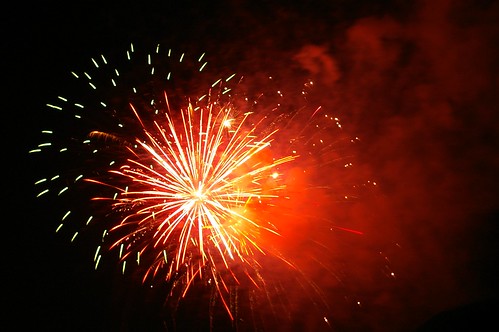
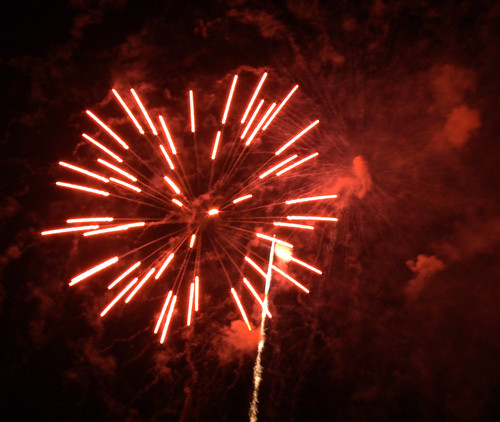
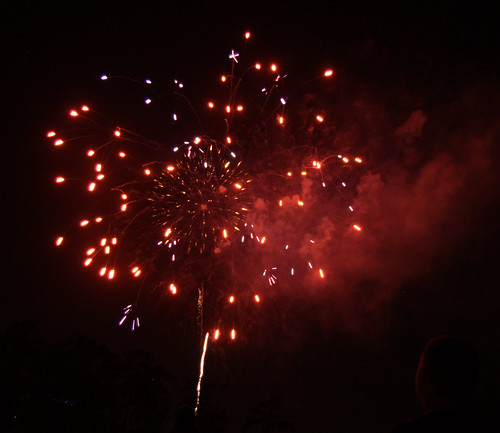

So there I sat, on the lawn of the Hermann Park amphitheater, listening to the first lovely strains of Tchaikovsky's 1812 Overture (and the less lovely strains of "Whut tha hell, I thought this wuz tha one with tha cannons 'n s%^$." from neighboring blankets) on a balmy July 4th evening. It was a lovely rendition...Houston is renowned for its symphony, opera, etc...the very best that money can buy, which is, of course, the local equivalent for quality and culture, but still does manage to produce some enjoyable opportunities if one happens to be able to afford it, or is willing to sit on the lawn on July 4th, drinking in the spilled-over largess of an economy flush with oil cash.
But back to the 1812. I had one of those..."hey, wait a moment" moments, as the piece continued, and strains of the French national anthem were put in counterpoint to the main theme. I'm certainly not new to the piece. Even those who have had little exposure to classical music have at least heard the final theme from the piece, as it is carted out every 4th alongside our other national songs. I guess I had never thought much of it until the French angle started to make me wonder.
Why was the french national anthem a counterpoint in a song of the War of 1812?
Yes, yes history majors, I see you with your hands up, straining to be called on. As you would no doubt point out with all due smugness, the war of 1812 overture is not about the American War of 1812. It's an anthem memorializing the Russian defeat of the French under Napoleon at such and such a battle that just happened to be in 1812, which, since it has nothing to do with Nascar, American Idol, or celebrity scandals, is probably lost on the collective knowledge of the vast majority of us. The main point being it has nothing to so with the U.S. history, and thus the French theme is very fitting for the piece.
So that, of course, begs the question, "why do we play it on our 4th of July celebration?"
A more cynical man than I would argue that it has something to do with "OMG DOOD, TEH CANNONZ!!! BLOWIN UP S%&^ IS AWESUM!!!".
And here is where this long winded posts take the turn from the random example to the more general concept it brought to light for me...
To find out this answer, I did what every curious person who has not been living under a rock in a cave in a remote region of Kazakhstan does.....I wiki'd it.
And of course, there were very logical historical and cultural explanations of the use of this song and how it became synonymous with the 4th, and so on, which I will not burden you with.
So, while that satisfied my curiosity, it got me thinking about Knowing, and how it has changed over the past couple hundred years. With Wikipedia, and the Internet in general, it seems more and more we are externalizing knowledge to great degree. This leads me to four interesting (at least to me) lines of thought about knowledge and how we interpret, use, and store it, and what it means for future generations
1) externalization of knowledge
This, as stated previously, is not a new concept. Nor is it a new phenomenon. Knowledge has undergone a continual process of externalization alongside the development of technologies. What once was oral tradition became bound in book...what once was in books and newspapers became broadcast through the ether in first telegraph, then radio, then television. Then the vast knowledge mother ship of the Internet became the next great leap forward, offering not only the mass-broadcast abilities of television, but the (relative) permanence and accessibility of books. With each subsequent step we have pushed more and more of what was once intimate and personal knowledge out into a more general societal pool. Some would argue that this is a liberation, that knowledge and information are no longer the tool and property of the elite, that it has prompted a Renaissance of egalitarian access to the tools of self-betterment. I would tend to agree, to an extent. But what makes me wonder is how this affects the balance of what we know personally, and what we know collectively. There's a great webcomic called "Luz, girl of the Knowing" about a young girl re-learning skills and natural knowledge for when society changes after "peak oil". It echoes the things I think about when I picture the skills my grandfather had, versus the skills I have. Our grandparents can learn to use the Internet, but how many of us can build a house? how many of us can even change our own oil?How many of us can do any of the myriad of domestic skills that were passed down from father to son, from mother to daughter but have now been externalized to a great collective degree? I have come to take pride when I learn to make some thing, or do something for myself, even if it might be easier to have Jiffy-lube change my oil, or buy a desk instead of making one from raw lumber. It seems to me that the things you create will always be of greater satisfaction than the things one consumes, but increasingly we have become a society built around the consumption, but not necessarily internalization, of knowledge.
Don't get me wrong, I love Wikipedia. But to some extent it is an intellectual crutch. And I think crutch really is the right word, because a crutch is both a useful tool, but also can be something that is leaned on unnecessarily. There is no real need to KNOW things in an increasingly interconnected world, when a 20 second search on wikipedia can supply you with the collected knowledge of the world on any given subject. As technological progress increases exponentially, it makes me wonder when the line between personal and collective knowledge will finally blur into non-existence. Will I have a direct connection to wikipedia or its successors, allowing instant mental access to the world's databases? At that point, where do I stop, and the collective begin? Is that the next real step in our evolutionary process?
2) the abandonment of knowledge
To me, hand in hand with the externalization of knowledge is what seems to be a broader abandonment of knowledge. Human eyesight is failing. The genetic disability of poor sight, which once selected against an individual for survival and passing on one's genetic material, is now a simple matter corrected by technology. I thought through my immediate family, and realized besides my sister and myself, everyone I know wears glasses or contacts, or has at some point. The exception has become the rule. While I do not bemoan this, it is a pretty poignant example of the principle I see at work with knowledge. As we externalize more and more of what we know, it is easier and easier to get by with not knowing. I do not need to know how to spell, I can auto-correct. I do not need to read book X, I can get the wiki summary in 30 seconds. I do not need to carry in my head the wealth of memories that form a life...they're all neatly frozen in thousands of digital pictures and blog entries and myspaces and facebooks, etc. With our increasing interconnected access to knowledge and our externalization of knowledge, it makes me wonder to what degree the liberation of the individual from the burden of Knowing also has its darker side in producing a society of, for lack of a better image than the cliche bee colony, become a hive mind, with each individual being reduced to the level of drone. At what point do the advances in the diffusion of knowledge enable the individual to devolve. What is the fine line between the technological crutch as a necessary tool, and as a personal hindrance? It seems like the externalization of, and access to, knowledge gives vastly improved possibilities for the individual for self-edification. But I question whether that will be the outcome. As pessimistic as it may sound, we are, for the greater part, a culture, and perhaps even a species, that seeks comfort. That seeks the easier path. Certainly we laud the individuals who eschew this to seek challenge, but i question whether that's the exception or the rule. If it's the exception, than I fear the externalization of knowledge will lead to individuals who rely far more on the collective, and far less on themselves, and for whom abandonment of personal knowledge becomes the norm.
3) the dilemma of the dilution of knowledge
I use the term dilution in a very very cautious way. I know judgement of the quality of knowledge is an inherently subjective thing. Even to measure how much (quantity) someone knows bears a certain degree of subjective assumption, but as to the quality of that knowledge, that is certainly a debatable point. So when I speak of dilution, please hear me out before attaching a negative connotation to that word.
This is the age old dilemma between the elitism of maintaining that knowledge is best kept and propagated by experts, and the egalitarianism of saying knowledge is the property of the masses.
but I should explain how I get to that dilemma. With the externalization of knowledge comes greater access to it. Half a millenium ago, one was elite if able to read and perhaps in possession of a few books. A hundred years ago, most people did not attend university. Twenty years ago specialized knowledge (law, medicine, etc) was still very much the property of those who had invested goodly amounts of time in studying it. Even 15 years ago, discussions between groups of any size on a given topic were fairly limited by geography and communication means (i.e. prior to internet chat/BB's/forums/etc) for most people. now that has changed. Anyone can access medical information. Anyone can access legal advice, carpentry tips, engineering principles.
But, you say, that doesn't make them a doctor, a lawyer, a carpenter, or an engineer. And you are correct, and in that principle lies the heart of what I'm getting at. As knowledge and Knowing becomes more of a communal, collective thing, how does that affect the quality of the information...and how does the "real" knowledge get lost in the haze of uncertainty, like a cloud of electrons around an atom, when it is no longer the only voice, but one among a chorus. In technical fields, one may discuss a broadcast signal in terms of a signal/noise ratio...how much of the real signal do you get, compared to distractions, junk noise, etc. This is, of course, a simplification...in these terms there is a known, "real" signal, and an objective way of measuring its strength. While the same basic principle applies to knowledge, it is a far less direct comparison, as what is the "real signal" is less certain. But the concept to consider may be explained by these examples.
I receive chain mail all the time. Everything from the latest dire warnings rooted in urban legends "Don't mix pop rocks and soda, you'll blow up", "fluoride is poisoning our children!!", etc, to political mud slinging, etc. With the exception of such shining cities on a hill as Snopes.com, there really isn't a counter to the misinformation of the internet era. Urban legends, and propaganda ranging from topics of politics to race, flood the interwebs. This is the counterpoint to the liberation of access to knowledge and the means of production thereof. The downside to the admittedly vast benefits. And here is where the elitist v populist dilemma comes into play.
In more traditional knowledge regimes, the "folklore" (old wives tales, gossip, propaganda) was separated to a greater degree (the effects of deliberate efforts by political and economic powers notwithstanding) from the realm of "rational knowledge"...(medicine, law, science). Without drawing any quality judgements, you had two slightly overlapping ways of knowing. However, there were checks and balances inherent, to some degree in the less liberated flow of information. With the advent of this greater access and externalization of knowledge, some of those traditional barriers are broken down. The modern folklore (the urban legend email, the political propaganda) becomes part of the same mix as the "fact" (again being very wary of such absolute terms). A greater number of voices in the knowledge marketplace means a great cacophony of sound....a greater noise aspect to a "true" signal. With a vastly expanded number of potential sources of information, there is less concentration of reliance on a single source as a common reference point. While this is certainly advantageous in terms of some of the more negative aspects of traditional hegemonic propagation of strict norms, it does, like all other principles here, have a flip side. Look up any medical condition, and you will get sites like the AMA, but you will also get a host of alternative medicine sites, etc. While not drawing a conclusion about which way of knowing is the correct one, the issue really is the increasingly difficulty of sorting through a vast sea of knowledge. As more and more voices get access, more and more versions of the truth become available. While this is great in terms of debate over philosophical issues, etc, it can be problematic in terms of things that are more rooted in fact, like science. There are real facts involved, in,say, the fluoridation of water. But anyone can start a website that selectively and improperly cherry picks fragments of information and weaves them into a tale that would have you shuddering to drink tap water. For the average consumer, the lack of a singular opinion becomes problematic in terms of sorting through the vastly expanded body of knowledge to find an answer. This is the dilution of the body of knowledge. Please do not take from this a negative tone to this discussion, I am simply interested in sifting through the potential issues that accompany the admittedly great benefits of greater access to collective knowledge.
4) the death of mystery
This is perhaps the most interesting of the four themes, and hopefully if anyone has made it through to this point, they will continue here.
Along with that externalization comes the need to never not know, at least on anything but the most obscure or esoteric knowledge. 10 years ago, it would have taken a great deal more effort to get my 1812 overture answered. 10 years before that, perhaps even more. At some point, i would have been content in NOT knowing. It is not irony that has died in the new era, but mystery. And it seems knowledge has become a drug in its absence. The 24 hour news cycle, then endless political speculation, the obsession with the lives of the famous, the endless debates on the internet, no mystery can be left unsolved, no thing unknown, to the point of obsession. Is the ability to not know of equal important to the ability to know? To be able to be content with not knowing certain things that are not vital? Given the rapid externalization of knowledge, and this obsession with rooting out and labeling every potential piece of knowledge, it gives the feeling of (though no negative implications intended) a virus. Consumption becomes its own end, but it serves no purpose as the product thereof is not held in memory, but shunted out to external data storage. of course this is a one-sided view, but in the wonderful forward march of human knowledge, it does interest me to see what has fallen dead at the side of the road. Perhaps it is just a personal thing....to me, the unknown holds a certain appeal...the intellectual thrill of something beyond the border of knowledge, the freedom to imagine. When I was a child we played in the woods. There were no strategy guides, nor websites devoted to it like a video game or sport, it was full on, raw imagination. When we played out any given make believe scenario, we lived in a world of possibility, and that possibility was in and of itself appealing. When we were done for the day, our memories were our own. And they lived and died with our ability to hold on to them ourselves. They were not quickly shunted to a blog (IRONY), or part of a regimented and rigidly controlled activity. They were not shaped by discussion from a thousand other kids on a chatroom, and held to an image propagated by an increasingly ubiquitous media presence. They were raw, and they were ours, and they were surrounded and buoyed on all sides by a generous degree of NOT knowing. And the void of not knowing became filled by our creations, rather than the consumption of someone else's knowledge. And there, to me, lies the heart of the lack of mystery...the lack of space or inclination to set foot in new territory, and fill it with one's own ideas. The freedom to not be hemmed in by fences of accepted and universally upheld ideas, but to find and inhabit a place of one's one. On a broader scale, I can't help but wonder what this means for true innovation in the coming decades, not just in technology, but in human thought.
Thank you for reading my pretentious ramble. It was written all in one short sitting, so please excuse grammar, and lack of properly structured arguments. Just the ideas rattling around in my head on a slow day.
As a reward, here are some fireworks to accompany the 1812 story:




Subscribe to:
Comments (Atom)

